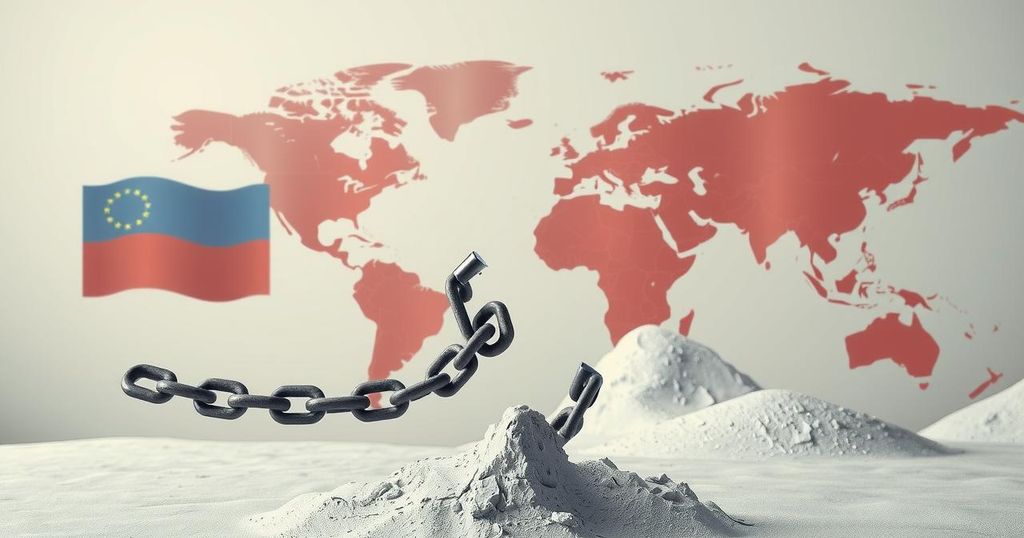The Democratic Republic of Congo has requested UN sanctions against Rwanda, claiming troop movements signify a declaration of war. The Rwandan-backed M23 group continues to advance towards Goma, increasing tensions and resulting in peacekeeper fatalities. The DRC urges for sanctions against Rwanda while diplomatic relations have severely broken down between the nations. The international community is advocating for ceasefire and condemnation of Rwanda’s actions.
The Democratic Republic of Congo (DRC) has formally requested the United Nations to impose sanctions against Rwanda, accusing it of declaring war by moving additional troops across the border. This military reinforcement is reportedly assisting the Rwandan-backed M23 group, which is making advances towards Goma, the capital of North Kivu province. The situation has escalated, with multiple peacekeepers being killed in the ongoing clashes, prompting UN Secretary-General Antonio Guterres to call for the withdrawal of Rwandan forces from Congolese territory.
During an emergency meeting of the UN Security Council, DRC Foreign Minister Therese Kayikwamba Wagner stated that Rwanda’s troop movements represent an outright violation of national sovereignty and constitute a “frontal assault, a declaration of war.” Reports indicate that between 500 to 1,000 Rwandan soldiers have crossed into the DRC, joining the M23 forces. Kayikwamba urged the Security Council to impose targeted sanctions, including asset freezes and travel bans, against Rwandan officials.
As tensions rise, diplomatic relations between the DRC and Rwanda have deteriorated significantly, with both nations withdrawing their diplomats from each other’s capitals. Following canceled peace talks, M23 has advanced rapidly towards Goma, a strategic city facing heavy military activity, including drone strikes. The conflict has resulted in a growing number of displaced individuals seeking refuge in the city, further straining its resources.
Global condemnation of Rwanda’s actions has intensified, with calls for an immediate ceasefire from the African Union and the United States. Guterres has emphasized the need for both the M23 to halt hostilities and for Rwanda to withdraw its support from the militia. Additionally, a UN report has indicated that Rwanda utilizes the M23 to access the DRC’s mineral resources, calling into question its motives.
In light of these developments, Kinshasa has proposed a total embargo on the export of minerals labeled as Rwandan, especially gold. Meanwhile, Rwanda’s Foreign Affairs Minister has confirmed the evacuation of diplomats due to threats from Congolese officials. Previously, the M23 had seized Goma briefly in 2012 before being restructured after suffering military defeat, yet they have resumed hostilities amidst a history of failed ceasefire agreements.
With ongoing violence in the eastern DRC, rival armed groups continue to battle for control over the region. The UN peacekeeping mission, which includes approximately 15,000 personnel, has faced casualties, with reports of 13 peacekeepers killed recently. In response to the risk, the UN has begun evacuating non-essential staff from Goma to safeguard their personnel.
The conflict between the DRC and Rwanda originates from a complex history characterized by ethnic tensions, dominance over natural resources, and involvement of various armed groups. The M23 group, which is reportedly backed by Rwanda, has been a significant actor in the ongoing violence, seeking territorial control and exploiting mineral wealth. Diplomatic efforts have been intermittent, leading to recent escalations in military confrontations, particularly around Goma, a city of strategic importance. Additionally, the international community’s response has been characterized by calls for ceasefire and sanctions against any aggressor.
In conclusion, the Democratic Republic of Congo’s urgent appeal to the United Nations underscores the escalating conflict with Rwanda following significant troop movements across their shared border. The DRC’s call for sanctions reflects a broader concern over national sovereignty and regional stability. As the international community responds to the crisis, dialogue and diplomatic resolutions are crucial to avoiding further violence and maintaining peace in the affected areas.
Original Source: www.citizentribune.com






